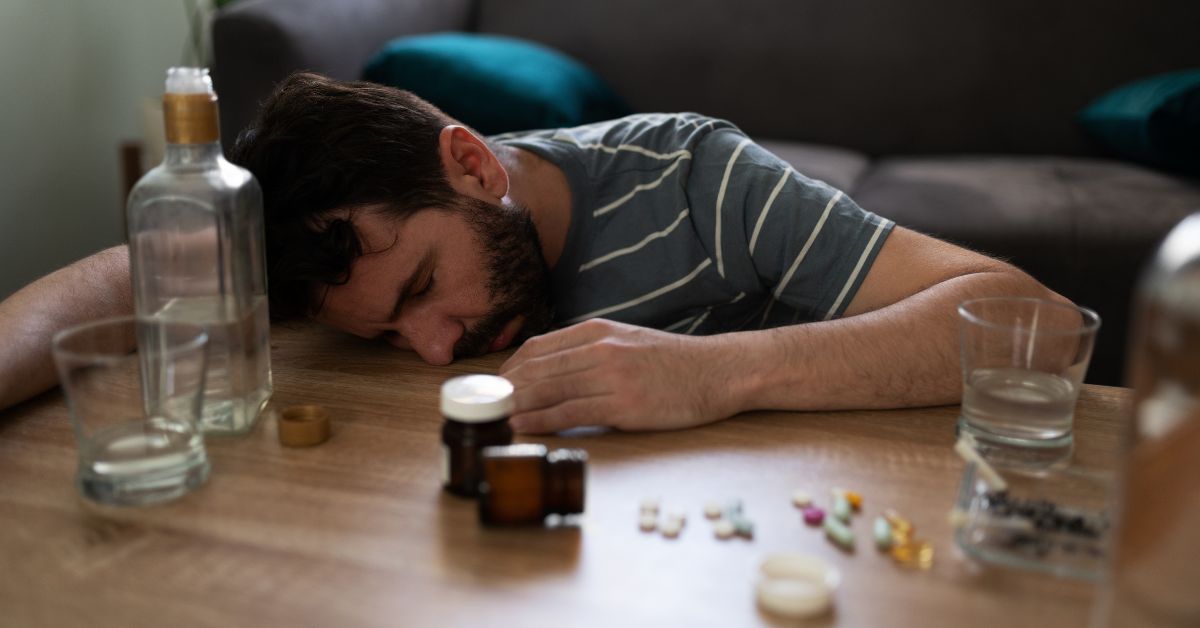Navigating the unpredictable path of your loved one’s addiction recovery can be filled with hope and fear.
Each small victory is a cause for celebration, but the constant worry of relapse can be overwhelming.
It’s always there, lurking in the background, never quite disappearing. However, what if I told you this fear can be helpful?
By learning to recognize the early warning signs of a relapse, you can help your loved one to stay on track toward recovery.
Let’s focus on these signals and transform apprehension into a valuable tool to help you and your loved one navigate this journey.
Understanding Relapse and Addiction
Dealing with alcoholism or drug abuse is like being lost in a maze. You’re constantly searching for a way out, but sometimes you hit a wall. That wall is what we call a relapse.
It can be heartbreaking and discouraging, but it’s important to remember that it’s just one part of the journey.
Addiction: The Vicious Circle
To a person struggling with addiction, it can feel like they are stuck in an unavoidable cycle of bad habits during recovery.
This can involve using drugs, alcohol, food, or other behaviors that trigger the reward systems in their brain, leading to an overwhelming compulsion to keep using and even increasing their dose over time. This cycle can get so bad that the person begins to feel like they need to use it to be “normal.”
Relapse: The Eye of the Storm
Addiction can feel like a never-ending storm that keeps pulling you back in, making it hard to break free. Sometimes, relapse can happen when things are good, but it is a common part of the process.
Addiction is a chronic disease that takes time to overcome, so your loved one shouldn’t be too hard on themselves if they experience a relapse. Instead, it should be seen as an opportunity to learn from mistakes and build stronger coping mechanisms for the future.
GET: The 3 things that actually "allowed" me to help my son (and regain control again)
The Dance Between Addiction and Relapse
Addiction and relapse work hand in hand, and it’s not always an easy journey. However, recognizing this connection can help bring clarity and insight to the situation. Remember, with the right tools and support, you can overcome this and keep pushing forward.
- Note the signs: Be mindful of what may trigger your loved one’s drug or alcohol abuse, like people, places, feelings, or situations.
- Accept the process: Understanding that relapse is part of recovery motivates your loved one to continue.
- Never lose hope: Each time your loved one stumbles, use it as an opportunity to understand their triggers, treat their substance use disorder, and develop effective coping strategies.
Early Warning Signs of Relapse

When someone you love struggles to stay sober, some signs can help you recognize the issue. Relapse can start way before someone actually starts using the substance or doing the behavior they’re addicted to again.
It often begins with changes in how they act and maybe even pulling away from their support group, like not going to meetings and blaming others for their problems.
Before a relapse, it could be helpful to ask your friend or family member if it’s okay for you to point out any signs that things might be getting worse.
The sooner you notice these warning signs, the more time you’ll have to talk to them and find out what’s happening, if they’re open to that kind of conversation. If they’re not, then it’s important for you to know your limits and be clear about what you will and won’t put up with.
Mental and Emotional Signs
Many emotional symptoms, often ignored, are related to relapse. They vary from person to person, but the main ones are the following:
- Rapid shifts in mood and extreme highs and lows.
- Unprovoked anxiety and stress without an apparent reason.
- Looking back to the past drug abuse with a positive feeling.
Physical Signs
On the other hand, our bodies reflect physical health. Pay attention if your loved one’s body seems different than usual; these changes might be signs of a potential relapse.
- Sudden change in weight within a short time.
- Neglect personal hygiene and self-care.
- Recurring headaches, stomach problems, or other health concerns cropping up frequently.
SEE: Find out why your boundaries keep getting crossed (and how to reinforce them)
The Stages of Relapse
The journey towards recovery is not a straight road but more like a hike through hills. It involves ups, downs, and rest points, with occasional setbacks that serve as opportunities to learn how to stay committed to sobriety.
It’s crucial to understand that you can pick up valuable skills and strategies during each recovery period.
Let’s say, for instance, someone struggling with addiction learns to identify their triggers and find healthier coping mechanisms. Now, when they experience a relapse, their recovery journey doesn’t start from scratch.
If this happens to your loved one, they’ll have that foundation ready to build upon. So, they’re not just starting over each time – they’re actually growing and learning from their experiences, though this may not be apparent to others.
Emotional Relapse Stage
It can be challenging to recognize the beginning of relapse. Still, it starts with a shift in your loved one’s emotions.
- Self-isolation, withdrawing from loved ones and support groups.
- Extreme feelings of anger, anxiety, or restlessness.
- Irregular sleeping patterns, sleep disturbances, or needing to sleep all the time.
Mental Relapse Stage
In the mental relapse stage, your loved one might struggle to balance their past drug habits and their desire to stay sober.
- Looking at memories with the substance through a positive lens.
- Planning to secretly use it again.
- Taking many impulsive decisions that lead to harmful situations.
FREE: Get the 3 pieces of advice that helped me understand this disease of addiction
Physical Relapse Stage
Lastly, we arrive at the physical relapse stage. After dealing with the previous symptoms, the individual starts reusing the substance.
- It starts as a minor slip, where the individual thinks they can control their usage this time.
- When someone cannot control drug and alcohol use, it leads to dangerous behaviors and dependence.
- Later, a full-blown relapse finally happens, representing a total return to their former substance use pattern.
Tips to Avoid Relapses During Recovery

Preventing relapse is complex, and slipping up and falling back into old habits is very common. With the right strategies and support, your loved one can find the balance they need to successfully reach their goals.
Managing Triggers
Triggers are memories of your loved one’s past addiction that make them want to use again. Learning how to manage them effectively will help diminish the relapse risk.
- Identifying the causes: Recognize the influences, whether they are people, places, or emotions, that lead to substance abuse.
- Creating response strategies: Adjust your actions and reactions to safely deal with a dangerous situation.
- Practicing mindfulness: Encourage your loved one to use grounding techniques and stay aware of their thoughts to avoid addiction relapse.
Developing A Solid Support Network
Support from family and friends can be beneficial when your loved one is on the road to recovery. It’s like having training wheels that keep them steady and help them navigate any bumps on the road.
- Leaning on loved ones: Family and friends not only offer emotional safety but also hold the individual accountable when they need it.
- Finding more company: Support groups offer guidance and a shared experience for those navigating similar situations.
- Embracing professional aid: Expert advice from therapists or counselors can help ensure a smooth and successful recovery.
NEW: How to make the shift from "Mom Code" to prioritizing your own well-being
The Role of Rehabilitation and Treatment Centers
Rehab and treatment centers can help your loved one find their way during substance use recovery. These facilities guide them, offer a safe space, provide tools to face any challenges, and help them stay on the right path toward recovery.
Early Intervention: Can Treatment Centers Help?
As your loved one navigates through their recovery journey, it’s essential to have a support system to avoid relapse. If you have forced your loved one into rehab, don’t worry. These treatment programs are designed to prevent relapses and avoid alcohol or drug use.
Treatment centers can act as your loved one’s guideposts, providing expert insight into the signs that could lead to a setback. Also, recovery centers offer tools and strategies to help them navigate tough times. By recognizing warning signs, your loved one will be better equipped to stay focused on their goals.
Rehab: The Roadmap to Recovery
Rehabilitation is a map on this journey towards recovery. It’s designed to help your loved one navigate the difficult terrain, allowing them to stay on the right path and avoid stumbling blocks along the way.
- Personalized treatment plans: The experience is customized to individual needs and the obstacles along the way.
- Skilled professionals: Therapists and medical professionals guide through all the addiction treatment. They are there to help you face any challenge and provide support to stay on track.
- Structured routines: They bring discipline and order into your loved one’s life. This can help them stay on track during recovery and reach their goals.
Treatment Centers: The Guideposts and Rest Stops
Treatment centers serve as guideposts and rest stops for your loved one. They offer support, motivation, and safety to prepare for the next step toward recovery.
- Post-treatment plans: They provide ongoing assistance and guidance to stay on track after rehabilitation.
- Peer support: When your loved one sees that others are facing similar challenges and making progress, it can help them feel more motivated and determined to keep moving forward.
- Prevention tools: Treatment centers provide the skills and knowledge to identify potential triggers and manage stress.
Moving Past Relapse and Embracing Sobriety

It can be challenging when a loved one relapses and protecting yourself during that time is important. If your loved one is open to it, you can recognize warning signs and suggest proactive measures to help prevent a full-blown relapse.
Support from healthcare professionals and the recovery community is crucial to preventing relapse. With the right support network, professional strategies, and healthcare support, overcoming obstacles on the road to sobriety is possible. Every step your loved one takes brings them closer to finding a way out of addiction.
Frequently Asked Questions About the Warning Signs of Relapse
What are the early signs of relapse?
Early signs of relapse may include mood, attitude, or behavior changes, such as increased stress, disrupted daily routines, and glorifying past substance use. Other symptoms may include neglecting personal hygiene and changes in eating or sleeping habits. These signs often precede a relapse, providing an opportunity to prevent it.
What is the red flag for relapse?
A red flag for potential relapse is the recurrence of addictive behaviors or thoughts such as lying, isolation, fantasizing about substance use, obsessing, or creating opportunities for use. If left unaddressed, these warning signs may lead to relapse, returning one to the cycle of addiction.
WATCH: Free, confidential workshop that explains how to "Love Another Way"
What is the predictor of relapse?
Someone’s attitude towards recovery is the most significant predictor of a relapse. Factors like a lack of coping mechanisms, untreated mental conditions, declining participation in recovery activities, or increased stress levels can lead to a potential relapse.
When is the most common time to relapse?
The most common time for a person to relapse is usually within the first few months to a year after sobriety is achieved. People may still experience withdrawal symptoms and cravings during this time, making it hard to stick with sobriety. It’s important to understand that recovery from addiction is a lifelong journey that requires ongoing support and vigilance, even in later stages when the risk of relapse can still be present.
